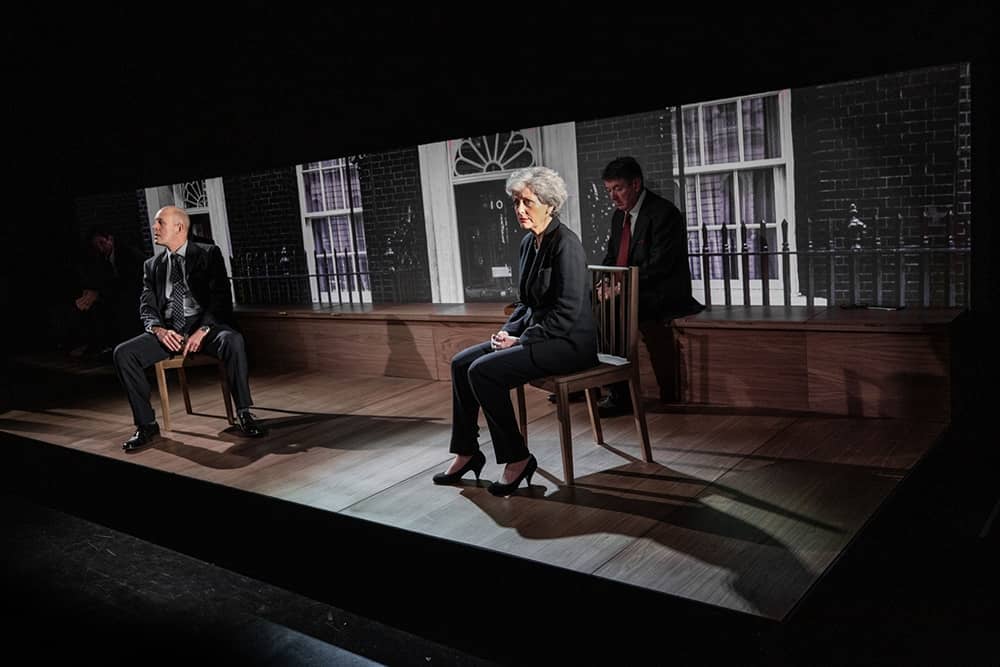Bloody Difficult Women is a documentary drama by the popular journalist Tim Walker, which looks at the similarities between Gina Miller and Theresa May. It’s well known that Walker detests our current prime minister and he refuses even to allow the Johnson name to sully his script. So although Boris was a key player in the story, he doesn’t appear on stage. Nor does May’s husband, Philip. And her influential advisers, Nick Timothy and Fiona Hill, are omitted too. Their names are mentioned constantly but we never meet them as characters. Slightly frustrating.
May herself comes across as weak, secretive and limited. Plainly she was never suited to high office. The script devotes much time to a shadowy Whitehall fixer, Sir Hugh Rosen, who hires young male civil servants and tries to seduce them. One of his good-looking studs puts a call through to Gina Miller and reveals confidential information from the PM’s office. If this were true, it would be a police matter but Sir Hugh appears to be a fictional creation and the story is invented as well. An odd thing to add to a factual drama.
The show isn’t perfect but it’s a must-see for Westminster obsessives
Miller is drawn as a surly, belligerent and enigmatic crosspatch. Very hard to warm to. Politics always attracts people who want to provoke arguments rather than to win them and she embodies that type perfectly. Her father was the attorney-general of Guyana and she seems to have lived in his shadow. After leaving Roedean, she tried to emulate his success by studying law at the Polytechnic of East London but her legal career faltered. The play suggests that her campaign against Brexit was an attempt to outdazzle Daddy and leave her mark on history. We’re offered a glimpse of her domestic life with her long-suffering husband, Alan, who bankrolled her recreational militancy. ‘I feel like the entertainments officer on the Titanic,’ he says of her chilly, mirthless hauteur. She reacts with fury, predictably enough, and suggests that they get a divorce.
The most potent and engaging character is Paul Dacre, the Daily Mail’s fiery boss, who dominates Theresa May and treats her like a promising cub reporter. He’s forever swanning into No. 10 and giving her instructions and encouragement. And he offers to burnish her image by writing sympathetic stories about her childhood. But she turns him down. Her shyness and caution blind her to the great opportunity he represents. On her 60th birthday she arranges a party in Downing Street but she has to choose a date when Dacre is available. He shows up with a Union Jack cake (sugar-free, of course), decorated with the Daily Mail masthead. No sooner has he arrived than he urges her to make her speech so he can clear off again. Andrew Woodall, on top form, plays Dacre as a demented, scheming baddie. He’s perpetually furious and unable to stop swearing. We get a few hints that he’s also a skilful and fearless tabloid editor but in general the portrait is unsympathetic. Deliberately so. When Dacre is forced to leave the Mail he rants and stomps around the stage, cursing hysterically. One expects the men in white coats to cart him off to an asylum. The show isn’t perfect but it’s a must-see for Westminster obsessives.
Seasoned screenwriter Ron Hutchinson has dedicated Ghosts of the Titanic to his grandfather, Jack, who worked on the doomed liner and may have been its first victim. He died of injuries sustained in the Harland & Wolff shipyard in Belfast. The script opens in New York in 1912 where a fast-talking sleuth is looking for sensational stories to sell to the papers. He stumbles on a series of rumours and secrets about the ship’s shoddy construction. After it left Belfast, there were still labourers on board rushing to complete their work. And when the maiden voyage began from Southampton there was an unextinguished fire in the engine room.
Then, comes another bombshell. ‘There was no iceberg,’ says one of the witnesses. This sounds incredible but Hutchinson’s script lays out the evidence compellingly. We’re told that J.P. Morgan, the most influential banker in America, was the owner of Titanic’s parent company, the White Star Line. Is it a coincidence that many of Morgan’s richest rivals went down with the ship? And there were celebrity travellers, like the radio pioneer, Marconi, who cancelled their passage at the last minute. Perhaps the right people were being tipped off.
The question is, why did none of this come to light earlier? The second act solves that problem. One of the crucial witnesses is visited by a corrupt doctor who diagnoses her with a fake mental illness. The use of medicine to suppress dissent has topical resonances today. This is a fabulous piece of entertainment. A century-old story that speaks directly, and chillingly, to viewers now.







Comments